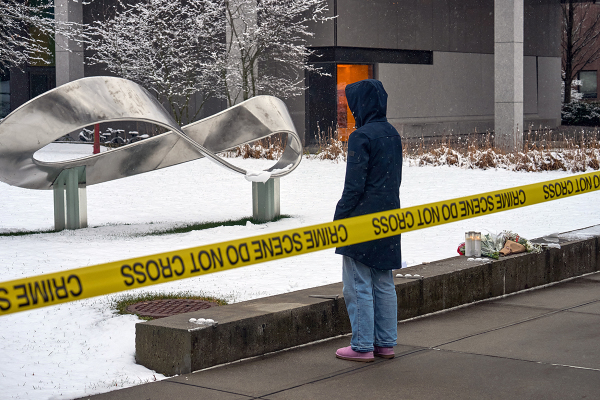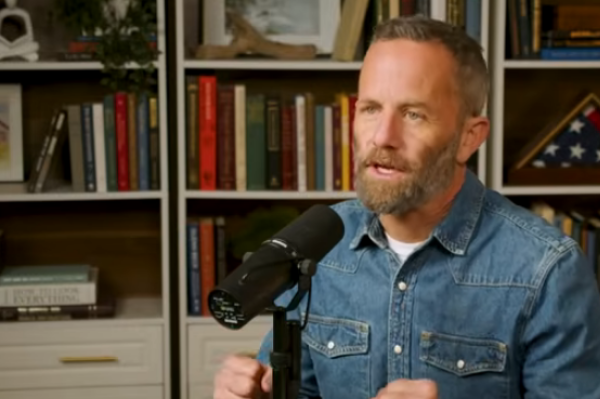An Inside Look at a New Generation of Pastors: David Platt on Why He Doesn't Need to Make the Bible Relevant (Pt. 5)

Editor's Note: In a season where every day seems to bring a new assault on traditional biblical views, there are nonetheless a whole new generation of young pastors preaching orthodox biblical Christianity and seeing their churches grow exponentially because of it. The Christian Post has picked but a few of scores of pastors enjoying the favor of God in this way, in an effort to find out what about the Gospel resonates in today's generation.
Pastors interviewed are under 40, most, but not all, in urban settings and are attracting Christians over a wide age spectrum, including Millennials and Generation X. These pastors uphold traditional biblical views of family and morality, yet attract young people and are gaining national reputations.
Today we spotlight David Platt, 34, pastor of The Church at Brook Hills in Birmingham, Ala., where up to 4,500 people attend on any given Sunday. Platt has authored several books, including "Radical Together: Unleashing the People of God for the Purpose of God," and "Follow Me: A Call to Die, A Call to Live." He is also the founder of Radical, a resource ministry, dedicated to serving the church by "making disciples of all nations." Platt is a nationally renowned speaker often requested at leadership and conference events.
Below is an edited transcript of Platt's interview with The Christian Post.
CP: You are experiencing success gathering people to orthodox Christianity in a generation increasingly opposed to it. How would you explain this?
Platt: Ultimately, I believe the Lord is drawing people to Himself from the culture around us and He does that through the truth of who Christ is and what is taught in His word. I really don't want to over simplify the picture, but God's faithful to His word. Since Christ came He has been drawing people to Christ through the proclamation of His word. In some sense, people will resist the Word, it's part of our sinfulness, but at the same time, this is the means by which God has chosen to draw people to Himself. Even in a generation where religious pluralism, moral relativism, and biblical skepticism are increasing, there is still power in the Word by His Spirit so He is still drawing people to Himself. I can't think of anything particularly creative or innovative that I am or we are doing, apart from proclaiming His word and trying to authentically live it out. I believe that when we are faithful to do that then the Lord will draw people to Himself. I think God has designed this whole picture so that only He can get the glory for success in bringing people to Himself.
CP: Are you an expository preacher? An exegetical preacher? What kind of preacher are you?
Platt: My understanding of preaching is that all preaching, in order to be preaching, is expository. When I say expository preaching is that the purpose that I have when I stand before people on Sunday is to expose the voice of God and so, to minimize my thoughts and to magnify His truth in all preaching.
In order for it to be preaching it has to be exposing the voice of God. If we are exposing the opinions of men, the thoughts of men, [and] my own ideas, then I'm not preaching, I'm just talking and I'm sharing. It would be the height of arrogance and foolishness, really, for me to think that people need to gather together to hear from me what I have to say from my thoughts, my opinions on Sunday, and that we are going to build the church around that and I'll lead the church based on that. That's arrogant to think that my thoughts are more important than God's truth and foolish to think that's the best thing to give to people.
Exposition is what I think is implied by preaching, and so, every week I want to expose the word of God. Now, how that plays out when it comes to form may vary. My normal pattern is to preach verse-by-verse, book-by-book, and so we are walking through the book of 1 Corinthians now. I think that's probably the easiest way, and in some ways the most responsible way, to really be faithful to exposing the voice of God is to be walking through His word verse-by-verse or book-by-book. At the same time, I also don't think it's wrong to preach in a doctrinal sermon where we are looking at different texts and we are bringing them together to understand, OK, what does God say on this doctrine? What does He say on this topic? But the danger there is if you are not careful, I or anybody else can take different verses and kind of twist them to say what we want them to say and pull them out of their own context. When I'm doing a more doctrinal or topical sermon that means I have to do all that much more work to not pull verses out of context, and I'm really saying what God has said, not taking God's word and twisting it to what I want to say. My goal every single week in front of the people that I shepherd is to give them the voice of God, to say this is what God has said and to be able to say it in a way of humility and authenticity, and yet authority that only comes from the Word and doesn't come from myself. That is the essence of exposition.
CP: How do you do practical application?
Platt: In that process of exposition it's not just saying this is what the Word said when Paul wrote it 2,000 years ago. It's classic John Stott illustration of building a bridge from the text then to the context now and so I want to bring those truths that God has spoken clearly in His word to bare on the context that I am pastoring in and the people whom I am pastoring. I want to bring them across that bridge. I want them to see the Word and then apply it in their lives where they live. So that's where the truth of the text is the same throughout cultures, throughout time, throughout different context. The application of that text is going to look different in different people's lives. There is a real dependence upon the Spirit in a pastoral sensitivity to how does this text come to life in the place where I live, in the people whom I am shepherding. That's an intentional part of pastor preparation and an intentional part of what I want to do every Sunday, which is to bring people across the bridge to bare on people who live in Birmingham, Ala., in the 21st century.
CP: How do you set up your church to keep the practical application going? How do you make sure your congregants bear fruit?
Platt: Our goal is to set the stage for that on Sunday in the proclamation of the Word and wanting the application in their lives, challenging people to not just hear the Word, but to do the Word. We have a very intentional small group structure that comes from our worship gatherings where we encourage every member of our body to be in community where during the week, in relationship with each other, life on life, working out the truth of the Word that we've heard proclaimed in the specific context of our lives, our families, our work places, the community where we live, and the things that we are doing. We want every member of our body in that kind of community with a group of people who are really talking about and are holding each other accountable to carry out this Word in life in a good, grace-centered, Gospel-saturated way to really be helping each other make sure and say, "Hey, we're not just hearing the Word and living our lives. We are hearing the Word and doing the Word." This is discipleship, this is discipleship making, and so it's not that we need to hear more truths from God's word, it's we need to take the truth and apply it. Jesus commanded us to "teaching them to obey everything I've commanded you." So, it's not just teaching everything He's commanded, it's teaching to obey everything He's commanded. Obedience-based discipleship really revolves around small group community where people are applying the truth of scripture and holding one another accountable to apply the truth of scripture in practical way. All of that happening in community is necessary.





















